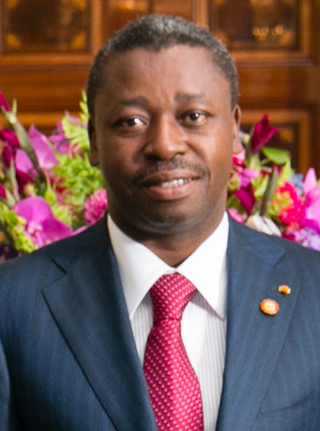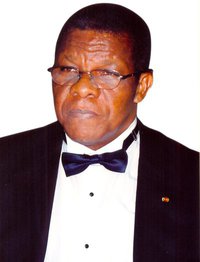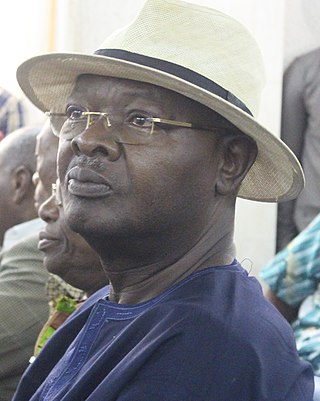Related Research Articles

Togo, officially the Togolese Republic, is a country in West Africa. It is bordered by Ghana to the west, Benin to the east and Burkina Faso to the north. It is one of the least developed countries and extends south to the Gulf of Guinea, where its capital, Lomé, is located. It is a small, tropical country, which covers 57,000 square kilometres and has a population of approximately 8 million, and it has a width of less than 115 km (71 mi) between Ghana and its eastern neighbour Benin.
The history of Togo can be traced to archaeological finds which indicate that ancient local tribes were able to produce pottery and process tin. During the period from the 11th century to the 16th century, the Ewé, the Mina, the Gun, and various other tribes entered the region. Most of them settled in coastal areas. The Portuguese arrived in the late 15th century, followed by other European powers. Until the 19th century, the coastal region was a major slave trade centre, earning Togo and the surrounding region the name "The Slave Coast".

Politics of Togo takes place in a framework of a presidential republic, whereby the President of Togo is both head of state and head of government. Executive power is exercised by the government. Legislative power is vested in both the government and parliament. After independence, the party system was dominated first by the authoritarian Rally for the Togolese People, and later by its successor party, Union for the Republic.

Gnassingbé Eyadéma was a Togolese military officer and politician who was the president of Togo from 1967 until his death in 2005, after which he was immediately succeeded by his son, Faure Gnassingbé.

Faure Essozimna Gnassingbé is a Togolese politician who has been the president of Togo since 2005. Before assuming the presidency, he was appointed by his father, President Gnassingbé Eyadéma, as Minister of Equipment, Mines, Posts, and Telecommunications, serving from 2003 to 2005.

Presidential elections were held in Togo on 24 April 2005, following the death in office of long-time president Gnassingbé Eyadéma. The main candidates were Eyadéma's son, Faure Gnassingbé, and opposition leader Emmanuel Bob-Akitani. The elections and the preceding period were marked by violence, with many people reported killed in various incidents. According to the official results, Gnassingbé won the election, taking slightly more than 60% of the vote. Violence flared in the capital Lomé after the results were announced, and thousands fled into neighboring countries.
Fambaré Ouattara Natchaba was a Togolese politician. He was the President of the National Assembly of Togo from September 2000 to February 2005. He was a prominent member of the ruling Rally of the Togolese People (RPT) and a member of the Pan-African Parliament representing Togo.

Joseph Kokou Koffigoh is a Togolese politician, human rights activist, and a poet who served as Prime Minister of Togo from 27 August 1991 to 23 April 1994. Elected as Prime Minister by the opposition-dominated National Conference in 1991, Koffigoh was given full executive powers and tasked with overseeing a transition to multiparty elections. Beginning in December 1991, however, President Gnassingbé Eyadéma increasingly reasserted his authority at Koffigoh's expense. Although Koffigoh remained in office, the opposition eventually abandoned him, feeling he had become too cooperative with Eyadéma.

Messan Agbéyomé Gabriel Kodjo was a Togolese politician who served as Prime Minister of Togo from 29 August 2000 to 27 June 2002.

Dama Dramani is a Togolese politician who was the President of the National Assembly of Togo from 2013 to 2018. He was Secretary-General of the Rally of the Togolese People (RPT), the ruling party, from 2003 to 2006, and following the 2007 parliamentary election he was President of the RPT Parliamentary Group in the National Assembly.

Pascal Akoussoulèlou Bodjona is a Togolese politician who served in the government of Togo as Minister of State for Territorial Administration, Decentralization, and Local Collectivities, as well as Government Spokesman, from 2007 to 2012. Previously he was Ambassador to the United States from 1998 to 2005 and Director of the Presidential Cabinet from 2005 to 2007.

Presidential elections were held in Togo on 4 March 2010. Incumbent President Faure Gnassingbé—who won his first term in a presidential election that followed the death of his father, long-time President Gnassingbé Eyadema, in 2005—faced radical opposition candidate Jean-Pierre Fabre, the Secretary-General of the Union of the Forces of Change (UFC), as well as several minor opposition candidates.

The 2017–18 Togolese protests were a significant representation of civil unrest in Togo and against the 50 year rule of the father-son combination of Gnassingbé Eyadéma and Faure Gnassingbé. The protesters demanded that the president honour the 1992 constitution, and demanding that he step down immediately. Gnassingbé offered the protesters the option of enacting the two-term limit set in the constitution effective from 2018, thus ensuring that he could stay in power until 2030. This has been rejected by the opposition. However, on 8 May 2019 the Togolese Parliament voted unanimously to accept this amendment and imposed this non-retroactive term limit on the president's office.

Protests against Faure Gnassingbé have occurred throughout Togo, starting when President Faure Gnassingbé assumed power after the death of his father Gnassingbé Eyadéma in February 2005.
The following events occurred in Togo in the year 2020.
The 2010–2011 Togolese protests were riots and demonstrations and strikes against the government and results of the 2010 Togolese presidential election. Protests began in March 2010. Protests saw violence against each other, stand-offs with police and brutality. As protests escalated and snowballed into a movement, more violence and crackdowns followed, with injuries and deaths reported on both sides.
The Togolese protests of 2012–2013 were mass uprisings against the long presidency of Faure Gnassingbé in Togo. Many were killed in the suppression of demonstrations. These protests coincided with the Arab Spring.

Parliamentary elections were held in Togo on 29 April 2024 to elect the 113 members of the National Assembly, alongside the first regional elections in the country. The ruling Union for the Republic won 108 of the 113 seats.

The 2005 Togolese coup d'état was the unconstitutional seizure of power by the military in Togo through the appointment of Faure Gnassingbe, son of long-time President Gnassingbe Eyadema, who had ruled the country for 38 years after leading a coup d'état of his own in 1967. On February 5, 2005, President Eyadema suddenly died of a heart attack. Rather than adhering to the Togolese constitution which mandates the Speaker of Parliament act as interim leader until elections are held within 60 days, the Togolese military instead capitalized on the speaker's brief absence during a trip to announce that Eyadema's son Faure Gnassingbe would be sworn in as the new president in order to prevent a "power vacuum" from taking place within the country. In a special session of the National Assembly dominated by the Eyadema clan's ruling party - the Rally of the Togolese People (RTP) - Faure Gnassingbe was overwhelmingly approved as the Speaker of Parliament by a wide margin of 67 to 14. A constitutional amendment was also later passed allowing Faure Gnassingbe to serve his father's term that lasts until 2008.
References
- 1 2 Togo: Will History Repeat Itself? (Report). Amnesty International. 19 July 2005.
- ↑ "Togo succession 'coup' denounced". BBC. 6 February 2005. Retrieved 7 January 2018.
- 1 2 Polgreen, Lydia (19 February 2005). "Togo President, Installed by Army, Agrees to an Election". The New York Times. Retrieved 7 January 2018.
- ↑ Mealer, Brian (13 February 2005). "Mass Protests Against Togo's President Turn Violent". The Washington Post . AP . Retrieved 7 January 2018.
- ↑ "Massive opposition protest in Lome, Togo". GhanaWeb. 19 February 2005. Retrieved 7 January 2018.
- ↑ "Mounting pressure prompts Togo president to resign". NBC News. 25 February 2005. Retrieved 7 January 2018.
- ↑ "Togo police clash with protesters". BBC. 27 February 2005. Retrieved 8 January 2018.
- ↑ "500 killed in Togo electoral violence – UN". Independent Online . AFP. 26 September 2005. Retrieved 29 December 2017.
- ↑ "Togo abductions cause new refugee stream". afrol.com. afrol News. 27 May 2005. Retrieved 7 January 2018.